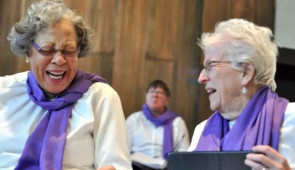Embed Video:
<iframe width="560" height="315" src="https://www.youtube.com/embed/PrLVxn6EaYI" frameborder="0" allow="accelerometer; autoplay; encrypted-media; gyroscope; picture-in-picture" allowfullscreen></iframe>
Those with neurocognitive disorders like dementia especially benefit
CHICAGO --- American philosopher and psychologist William James once said, “I don’t sing because I’m happy. I’m happy because I sing.”
A new Northwestern University Feinberg School of Medicine study has found even when singing with others virtually, the benefits abound.
In collaboration with Illinois-based Sounds Good Choir, the study assessed the feasibility of virtual group singing for adults over 55 — including those with neurocognitive disorders like dementia — during the COVID-19 pandemic when older adults were experiencing health declines due to isolation. It found virtual group singing can be an effective tool for promoting well-being and social connection during isolation. Listen to a virtual concert from spring 2020.
“Beyond the pandemic, the study suggests virtual singing could benefit individuals in rural areas, those with mobility limitations or those experiencing social anxiety,” said principal investigator Dr. Borna Bonakdarpour, director of the Northwestern Music and Medicine Program, associate professor of neurology at Feinberg and a physician with the Mesulam Center for Cognitive Neurology and Alzheimer’s Disease. “We found virtual group singing could provide emotional, cognitive and social support through accessible, engaging music programs for diverse aging populations.”
The study was published April 22 in the Journal of Alzheimer’s Disease.
Singing engages diverse neurophysiological processes by activating a neural network involved in respiratory control, emotional regulation and motor control, Bonakdarpour said. Lung capacity, posture and overall physical health often improve through the practice of singing. And choral singing has been increasingly recognized as a therapeutic activity for both cognitively healthy older adults and individuals with dementia and neurocognitive disorders.
For people with neurocognitive disorders — who frequently struggle with verbal communication — music and singing can offer alternative ways to express themselves, much like we see in individuals with aphasia,” Bonakdarpour said. “Singing familiar songs can help facilitate communication and create a comfortable, low-pressure environment for interaction and sharing.”
Previous research has focused on one group of singers and had fewer participants compared to this study, which compared two different group-singing interventions: a sing-along series with 52 weekly sessions of familiar music and a structured choir with rehearsals leading to a virtual concert. Of the 176 individuals surveyed, responses revealed high satisfaction, particularly in areas like anxiety reduction, social connection and physical well-being. The sing-alongs helped evoke emotional resonance through positive memories, while choir participation promoted intellectual engagement.
The overall tone of the responses was overwhelmingly positive, with 86.9% of responses mentioning positive impacts on well-being as a result of participation. In at least 5% of free responses, respondents mentioned the following themes: emotional well-being (36%); social well-being (31%); intellectual well-being (18%); sense of normalcy or structure (12%); spiritual well-being (11%); physical well-being (7%); and connection to the past (5%).
“Participants in the group choir during the pandemic consistently described the activity as providing a sense of normalcy amid widespread disruption — a theme that emerged prominently and merits further investigation,” Bonakdarpour said. “For individuals living with dementia, irrespective of external circumstances, the erosion of normalcy profoundly impacts their sense of self and contributes to anxiety. This suggests that such interventions may help restore a feeling of normalcy, supporting psychological well-being and offering a means of reconnecting with a stable sense of self.”
The next step in the research will be a nationwide trial funded by the National Institutes of Health Music Dementia Research Network.
This study is titled, “Virtual Group Singing Programs for Well-being in Healthy Older Adults and Persons with Neurocognitive Disorders During early COVID-19 Pandemic: A Perspective from Chicago.”
Other Northwestern authors include Clara Takarabe, who co-directs the Northwestern Music and Medicine Program with Bonakdarpour; and Elena Barbieri, research assistant professor of physical medicine and rehabilitation at Feinberg. Sandy and Jonathan Miller, directors of the Sounds Good Choir, are co-authors on the study.
Funding for the study was provided by Sounds Good Choir.
<iframe width="560" height="315" src="https://www.youtube.com/embed/PrLVxn6EaYI" frameborder="0" allow="accelerometer; autoplay; encrypted-media; gyroscope; picture-in-picture" allowfullscreen></iframe>
Photos from several Sounds Good Choir performances and rehearsals. Credit: Sounds Good Choir

